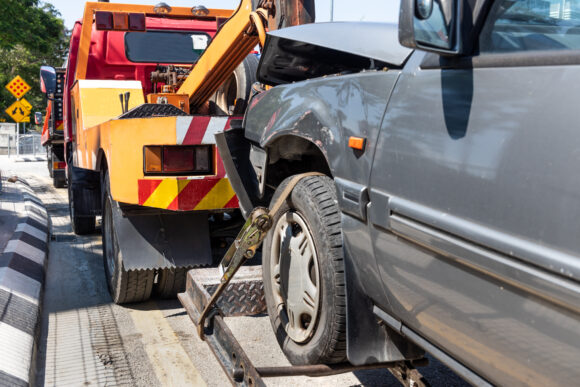Insurers are teaming up with truckers to persuade state lawmakers to pass laws that they hope will cut down on fraud by tow truck operators.
The Coalition Against Insurance Fraud announced Monday that it has formed a partnership with the American Trucking Association and the American Property Casualty Insurance Association to focus policymakers’ attention on the problems.
Coalition Executive Director Matthew Smith said commercial trucking companies are frequently victimized by unscrupulous tow truck operators who charge outrageous fees. Smith said drivers are sometimes billed $20,000 or even $40,000 for a tow and are unable to get their vehicles off the tow operator’s lot unless they pay it.
“The games that are played in a lot of this stuff is just frightening,” Smith said during a telephone interview. “There are classes that two truck drivers can go to, ‘how to double or triple your billings,’ and it’s promoted as ‘it’s just insurance, you’re not really hurting anyone.”
A new scheme emerged during the COVID-19 pandemic. Last July, the National Insurance Crime Bureau launched a billboard campaign in Chicago and Houston to warn motorists that some tow truck operators who respond to crashes will take advantage of accident victims. Forbes reported that one victim’s $4,700 bill included a $290 “COVID-19 cleaning fee.”
Smith said the new partnership with the Trucking Association will allow both groups to use their influence to push for legislation that will curb fraud and abuse in the tow truck industry. He said the partnership is drafting a model law to stem tow truck price gouging that it can offer to state lawmakers.
The Trucking Association is also cooperating with the anti-fraud coalition’s push to adopt legislation to combat staged accidents. In 2019, New York enacted “Alice’s Law” –– legislation that was inspired by 71-year-old Queens grandmother, Alice Ross, who was killed in a staged accident in 2003, the coalition said in a press release.
Smith said that language for the tow truck model law hasn’t been finalized, but it will likely include a mandate that tow truck operators take photographs to document any damage to vehicles before towing them. Also, tow truck operators should be required to disclose all fees in advance and allow consumers to pick up their vehicles during normal business hours.
Smith said some tow operators try to gouge insurers by telling the claims adjuster the vehicle can be picked up during limited hours, such as from 7 a.m. to 8 a.m. on Fridays. If the vehicle isn’t picked up, the owner can be charged another week in storage fees.
Smith said his anti-fraud coalition has had some success on its own in combatting tow truck fraud. On March 22, Kentucky Gov. Andy Beshear signed into law a bill that requires tow truck operators to provide photo documentation of damage, disclose fees and provide owners access to their vehicles during normal business hours. He said similar laws were adopted last year by Virginia and Oregon.
“Our members are increasingly concerned with the impact predatory towing and staged accidents are having on their ability to conduct business,” Trucking Association Chair Sherri Garner Brumbaugh said in a prepared statement.
Quinn Piening, president of the California Tow Truck Association, said he has no objection to requiring tow truck operators to document vehicle damage or disclose fees. He says that’s already standard practice at his company, Central Towing and Transport in Fremont, Calif.
Piening said many of the safeguards that the partnership seeks are already in place, at least for tows that were initiated by law enforcement agencies. He said his company has a contract with the California Highway Patrol that gives consumers a right to an itemized invoice and the ability to collect their vehicle during normal operating hours.
But Piening said insurers “are their own worst enemies” because they pay outrageous fees as billed by shady tow operators instead of taking them to court. He said insurers need to take a new approach.
“They can start by going after these tow companies that are taking advantage,” he said.
Was this article valuable?
Here are more articles you may enjoy.


 Asbestos Lawsuits Prompt Vanderbilt Minerals to File Bankruptcy
Asbestos Lawsuits Prompt Vanderbilt Minerals to File Bankruptcy  UK Floods Raise Specter of ‘Mortgage Prisoners’ Across Banks
UK Floods Raise Specter of ‘Mortgage Prisoners’ Across Banks  When the Workplace Is Everywhere: The New Reality of Workers’ Comp Claims
When the Workplace Is Everywhere: The New Reality of Workers’ Comp Claims  Besieged Berkshire Utility Tries to Rewrite Who Pays for Wildfires
Besieged Berkshire Utility Tries to Rewrite Who Pays for Wildfires 